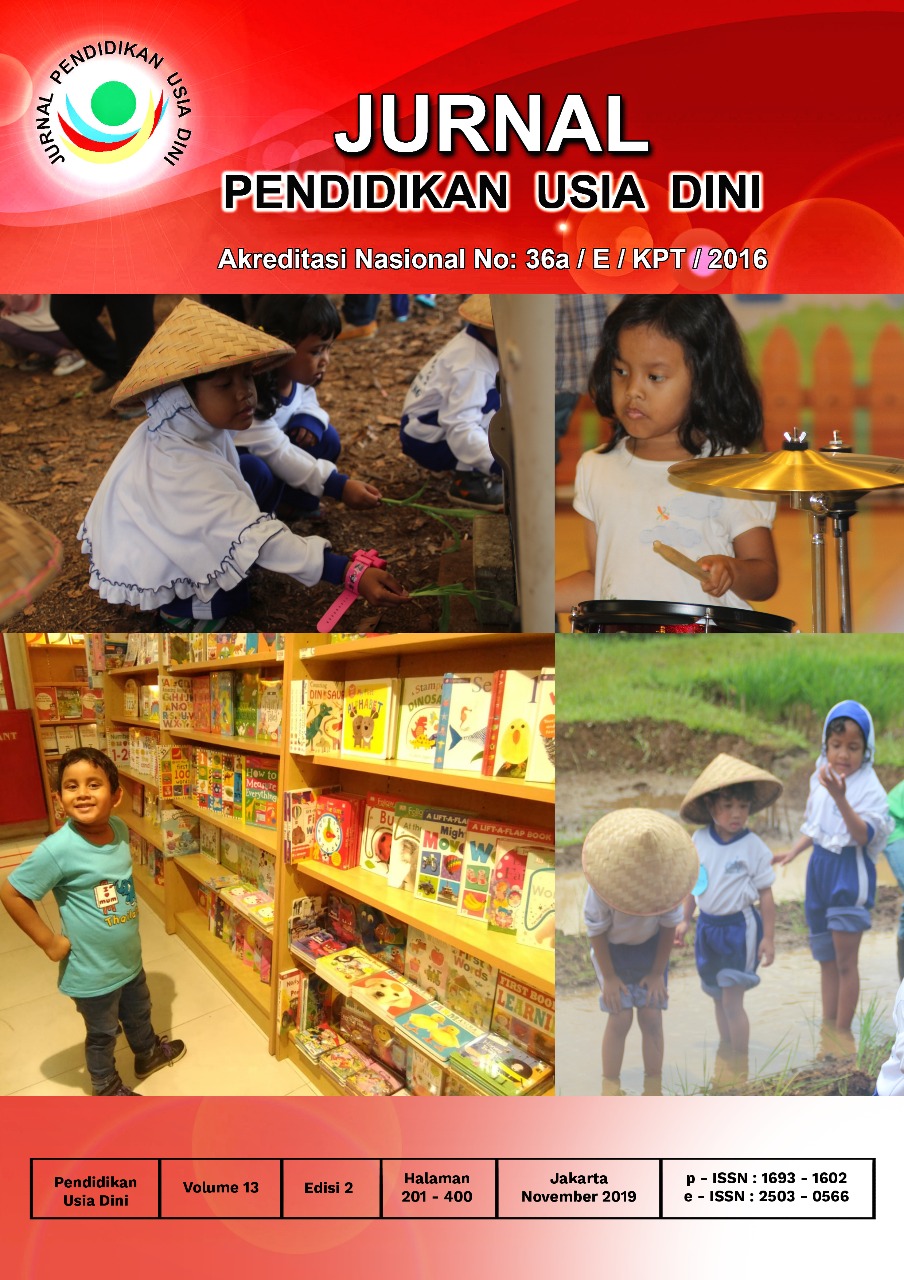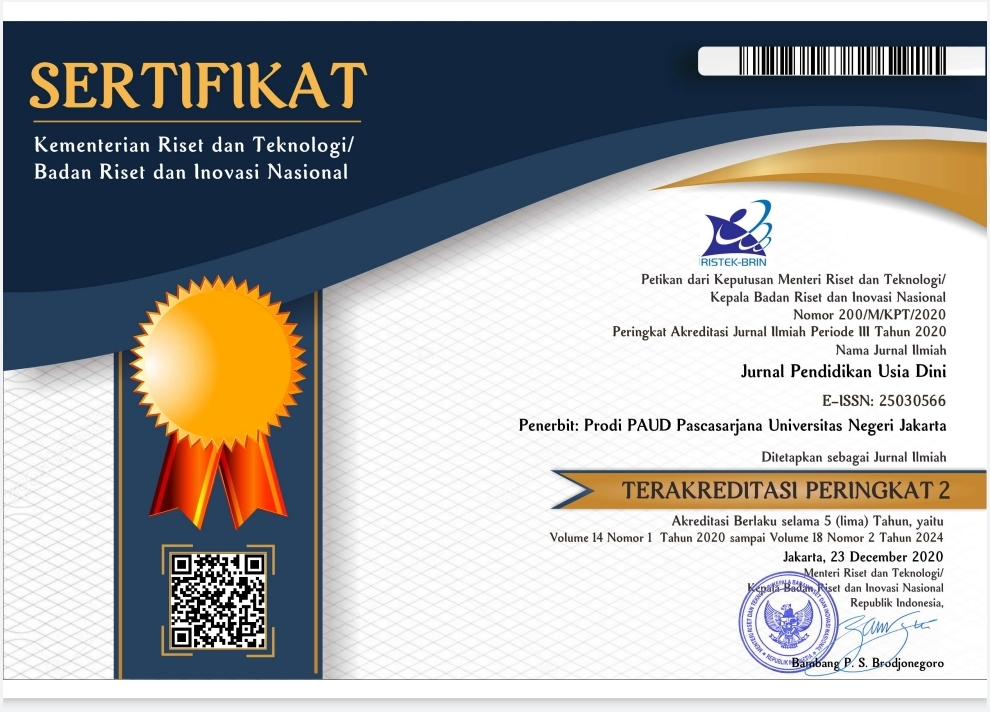Teacher Knowledge in Early Childhood Gender Education
DOI:
https://doi.org/10.21009/JPUD.132.09Abstract
The industrial development era 4.0, many threats lurk children in the form of bad influence through books, videos, or other media and become a challenge for parents and teachers. Gender education and the introduction of personal identity are important given early on. This study aims to determine the effect of teacher knowledge on the implementation of gender education in early childhood. This research uses quantitative survey research methods with a simple linear regression design for data analysis. The respondents were 34 early childhood education teachers. The results show the data with the conclusion that the calculated value> t table and p-value (sig) of 0.001 (<0.05) which means that there is a significant influence on teacher knowledge about early childhood gender education. Research suggests about how to improve gender education in early childhood education and create learning modules for early childhood teacher guidance.
Keywords: Early gender education, Teacher knowledge about gender education
References:
Adoniou, M. (2015). Teacher knowledge: a complex tapestry. Asia-Pacific Journal of Teacher Education, 43(2), 99–116. https://doi.org/10.1080/1359866X.2014.932330
Awaji M, A. K. (2016). Analysis of workrelated injuries among health care workers in armed forces hospi-tal southern region, kingdom of saudi arabia. Br J Med Med Res., 15(4).
Azwar, S. (2010). Sikap Manusia: Teori dan Pengukurannya Edisi 2. Yogyakarta: Pustaka Pelajar.
Chapman, R. (2016). A case study of gendered play in preschools: how early childhood educators’ perceptions of gender influence children’s play. Early Child Development and Care, 186(8), 1271–1284. https://doi.org/10.1080/03004430.2015.1089435
Cherney, I. D., & Dempsey, J. (2010). Young children’s classification, stereotyping and play behaviour for gender neutral and ambiguous toys. Educational Psychology, 30(6), 651–669. https://doi.org/10.1080/01443410.2010.498416
Filipović, K. (2018). Gender Representation in Children’s Books: Case of an Early Childhood Setting. Journal of Research in Childhood Education, 32(3), 310–325. https://doi.org/10.1080/02568543.2018.1464086
Francis, B. (2010). Gender, toys and learning. Oxford Review of Education, 36(3), 325–344. https://doi.org/10.1080/03054981003732278
Frödén, S. (2019). Situated decoding of gender in a Swedish preschool practice. Ethnography and Education, 14(2), 121–135. https://doi.org/10.1080/17457823.2017.1422135
Ghozali, I. (2011). Aplikasi Analisis Mulivariante dengan Program IBM SPSS 19 Edisi 5. Semarang: Badan Penerbit Universitas Diponegoro.
Huggins, V. (2014). Education 3-13 : International Journal of Primary , Elementary and Early Years Education Children at play : Learning gender in the early years. gray2011.p(November). https://doi.org/10.1080/03004279.2011.644316
La Paro, K. M., Van Schagen, A., King, E., & Lippard, C. (2018). A Systems Perspective on Practicum Experiences in Early Childhood Teacher Education: Focus on Interprofessional Relationships. Early Childhood Education Journal, 46(4), 365–375. https://doi.org/10.1007/s10643-017-0872-8
Lynch, M. (2015). Guys and dolls: a qualitative study of teachers’ views of gendered play in kindergarten. Early Child Development and Care, 185(5), 679–693. https://doi.org/10.1080/03004430.2014.950260
Meland, A. T., & Kaltvedt, E. H. (2019). Tracking gender in kindergarten. Early Child Development and Care, 189(1), 94–103. https://doi.org/10.1080/03004430.2017.1302945
Muasya, J., & Kazungu, T. (2018). ‘The unfinished business’: Exploring teachers’ views on gender and pedagogical practices in public preschools in Nairobi county, Kenya. African Educational Research Journal, 6(1), 10–19. https://doi.org/10.30918/aerj.61.18.007
Notoatmodjo, S. (2014). Ilmu Perilaku Kesehatan. Jakarta: Rineka Cipta.
Nursalam. (2014). Manajemen Keperawatan: Aplikasi Dalam Praktik Keperawatan Profesional. Jakarta: Salemba Medika.
Papalia, D. E., & Duskin, R. (2015). Perkembangan Manusia. Jakarta: Salemba Humanika.
Salawati, L., Herry, N., & Putra, A. (2014). Analisis Tindakan Keselamatan Dan Kesehatan Kerja Perawat Dalam Pengendalian Infeksi Nosokomial Di Ruang ICU RSUD DR. Zainoel Abidin Banda Aceh. 14(3).
Solehudin, M. (2018). Peran Guru Pai Dalam Mengembangkan Kecerdasan Emosional (EQ) Dan Kecer-dasan Spiritual (SQ) Siswa Smk Komputama Majenang. Jurnal Tawadhu, 1(3).
Sulastri, S., & Ahmad Tarmizi, A. T. (2017). Peran Orang Tua Dalam Pendidikan Anak Usia Dini. Raudhatul Athfal: Jurnal Pendidikan Islam Anak Usia Dini, 1(1), 61–80. https://doi.org/10.19109/ra.v1i1.1526
Suyadi. (2014). Teori pembelajaran anak usia dini, dalam kajian neourons. Bandung: PT Remaja Rosdakarya.
Vanner, C. (2019). Examining gender safety in schools: Teacher agency and resistance in two primary schools in kirinyaga, kenya. Education Sciences, 9(1). https://doi.org/10.3390/educsci9010063
Warin, J., & Adriany, V. (2017). Gender flexible pedagogy in early childhood education. Journal of Gender Studies, 26(4), 375–386. https://doi.org/10.1080/09589236.2015.1105738
Wingrave, M. (2018). Perceptions of gender in early years. Gender and Education, 30(5), 587–606. https://doi.org/10.1080/09540253.2016.1258457
Wu, Y. P., Wu, J. F., Chen, Y. M., Han, L., Han, P. G., Wang, P., & Gao, F. (2015). Shyness and School Adjustment Among Chinese Preschool Children: Examining the Moderating Effect of Gender and Teacher–Child Relationship. Early Education and Development, 26(2), 149–166. https://doi.org/10.1080/10409289.2015.970503
Zhukovskyi, V., & Kostiuk, O. (2015). Stages Of Gender Education In Canadian Secondary Schools. Comparative Professional Pedagogy, 5(2), 31–38. https://doi.org/10.1515/rpp-2015-0037
Downloads
Published
How to Cite
Issue
Section
License
JURNAL PENDIDIKAN USIA DINI work is licensed under a Creative Commons Attribution 4.0 International License. (http://creativecommons.org/licenses/by/4.0/)





